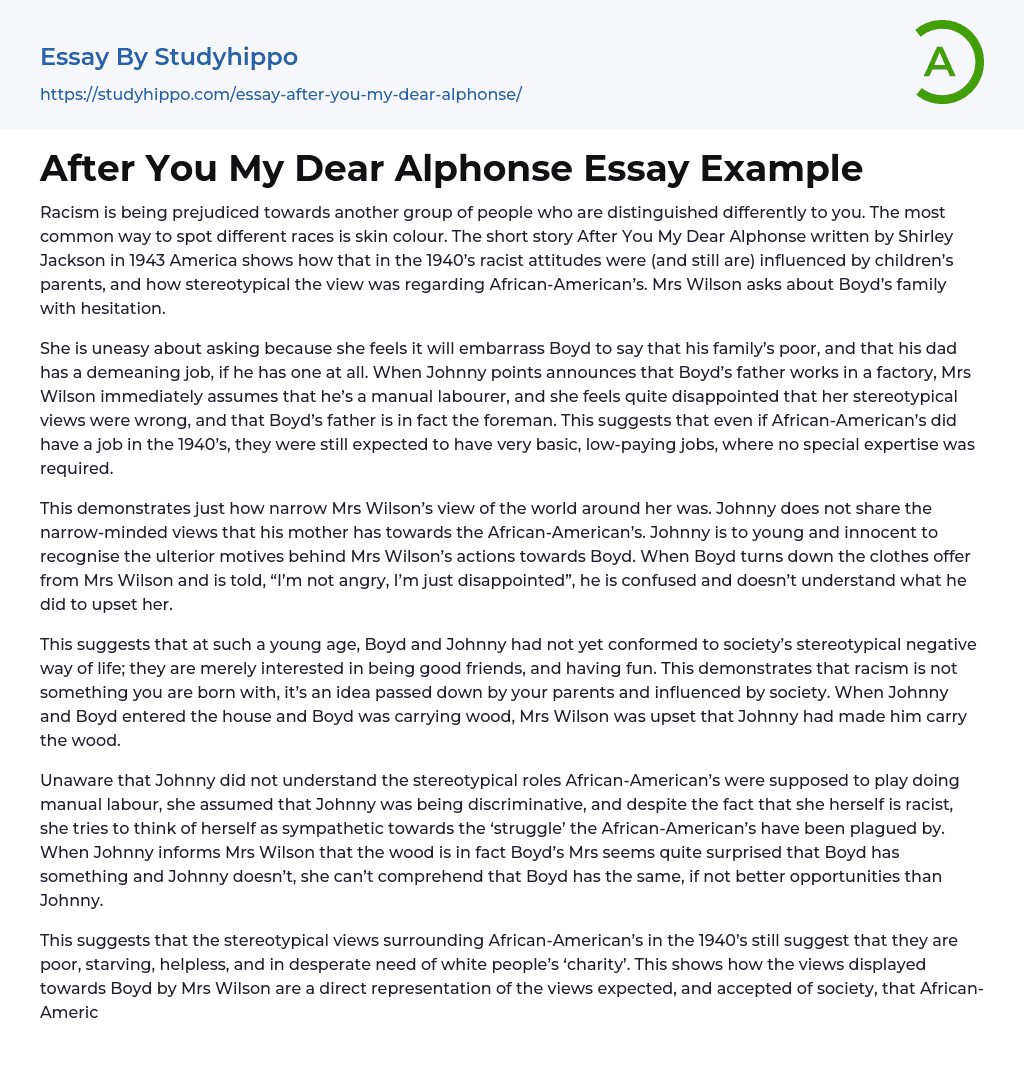She holds back from questioning due to the assumption that it might put Boyd in an uncomfortable situation, forced to declare his family's poverty and his father's potentially belittling employment status, if he even has a job. When Johnny declares that Boyd's father is employed at a factory, Mrs Wilson instantaneously assumes him to be a manual worker, and experiences disappointment that her
...preconceived notions were inaccurate. In reality, Boyd's father holds the position of a foreman. This subtly indicates the prevalent societal expectation in the 1940s that African-Americans, even if employed, would be engaged in rudimentary, low-income jobs requiring no specialized skills.
Mrs Wilson's perspective of the world around her is depicted as extremely limited. Unlike his mother, Johnny doesn't subscribe to the prejudiced viewpoint concerning African-Americans. Due to his tender age and lack of guile, Johnny fails to perceive the hidden motives behind the actions of Mrs Wilson directed at Boyd. When Mrs Wilson's offer of clothing is declined by Boyd and she responds with "I'm not angry, I'm just disappointed", Boyd is baffled and oblivious as to what he did to upset her.
The implication here is that when they were still so young, Boyd and Johnny hadn't yet subscribed to the
societal stereotypes that often lead to negative behavior. They were majorly focused on building their friendship and enjoying themselves. This underlines that no one is inherently racist, rather it's a thought process instigated by parental figures and societal pressures. When both Johnny and Boyd came into the house with Boyd having to carry the wood, Mrs. Wilson expressed displeasure at Johnny for making him do so.
Ignorant of Johnny's lack of understanding about the conventional roles African-American’s typically hold in manual labor, she deduced that Johnny was engaging in discriminatory behavior. Even though she herself harbors racist beliefs, she attempts to see herself as compassionate towards the struggles inflicted on African-Americans. When Johnny told Mrs Wilson that the wood actually belongs to Boyd, Mrs Wilson showed surprise. She finds it difficult to grasp that Boyd, an African American, could enjoy equivalent, if not superior opportunities than Johnny, a white American.
This implies that the conventional beliefs about African-Americans in the 1940s still portray them as impoverished, starving, and entirely reliant on the benevolence of white people. It further emphasizes how Mrs. Wilson's attitude towards Boyd is a clear reflection of society's prevailing and tolerated perception, which considers African-Americans as people with large families living in poverty, with no proof to validate their equality with whites.
- Malcolm X essays
- Black Lives Matter essays
- Antisemitism essays
- Ku Klux Klan essays
- Miscegenation essays
- Racial Segregation essays
- I Have a Dream essays
- Martin Luther King essays
- Racial Inequality essays
- Black History Month essays
- Black People essays
- Slave Trade essays
- Culture essays
- Social Control essays
- Citizenship essays
- Social Justice essays
- Caste System essays
- Social Responsibility essays
- Socialization essays
- Deviance essays
- Modern Society essays
- Popularity essays
- Civil Society essays
- Community essays
- Female essays
- Filipino People essays
- Igbo People essays
- Indigenous Australians essays
- Indigenous Peoples essays
- Minority Group essays
- Social Institution essays
- Men essays
- The nation essays
- Middle Class essays
- Social Norms essays
- Discourse Community essays
- Popular Culture essays
- Car Culture essays
- American Culture essays
- Mormon essays
- Indian Culture essays
- Mexican Culture essays
- Pop Culture essays
- Cultural Differences essays
- Culture Shock essays
- Different Cultures essays
- Ageism essays
- Cultural Diversity essays
- Discrimination essays
- Diversity essays




